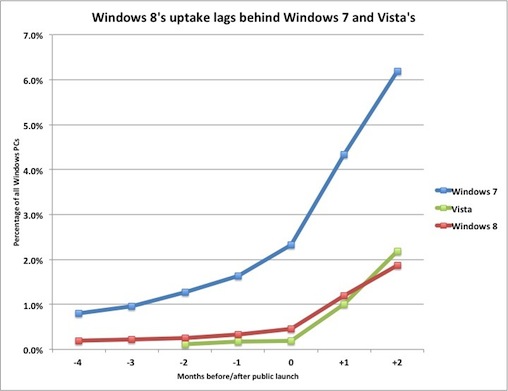Final online usage numbers for 2012 released Tuesday confirmed that Windows 8 failed to match Windows Vista's uptake pace during its first two months.
Preliminary numbers from Net Applications last week indicated that Windows 8 would end the month behind Vista's uptake at the same point in its release cycle. Yesterday's data confirmed the earlier projections by Computerworld.
According to the U.S.-based analytics firm, Windows 8's December global usage share was 1.9% of all Windows PCs, slightly lower than the 2.2% Vista posted in early 2007 after two full months of availability.
Windows 8 did make its strongest showing in the month's final week, however. In the week ending Dec. 29, which included Christmas, Windows 8 accounted for 2.1% of all Windows systems, a jump of four-tenths of a percentage point from the week before.
It was Windows 8's biggest-ever week-to-week increase since its Oct. 26 launch.
The inability of Windows 8 to keep pace with Vista is a troubling sign for the new operating system. Vista was pegged a failure, in part because it was adopted by relatively few customers, so associations with that flop rather than with the triumphs before and after -- Windows XP and Windows 7 -- could paint Windows 8 with the Vista brush.
While Windows 8 competed with Vista in uptake, it clearly has lost the battle with Windows 7. By the end of Windows 7's second month of availability, the 2009 OS powered 6.2% of all Windows machines, or more than three times Windows 8's current share, Net Applications' data showed.
But Windows 8 debuted in a decidedly different environment than did Vista, or even Windows 7.
Analysts, who have been predicting a weak reception for the new operating system for months, have cited a sweeping set of reasons for their forecasts. One, enterprise upgrade fatigue -- companies that recently moved from Windows XP to Windows 7 have no stomach for another migration anytime soon -- puts Windows 8 in the same boat as Vista.
In 2007, most businesses relied on Windows XP, a proven workhorse with more than five years behind it. Few bothered to tackle Vista. Windows 8 faces a similar situation, with the three-year-old Windows 7 now widely used by enterprises. Experts have said it's unlikely companies will migrate to Windows 8 because of the robustness of Windows 7 and their recent move to it.
Economic conditions may also be playing a part in Windows 8's lethargic uptake, although the data doesn't completely explain the new OS's sluggishness.
The Consumer Confidence Index, a widely-cited economic indicator, averaged 68.3 in the last two months of 2012, a far cry from the high-flying 109.7 of Vista's initial two months of availability during the first quarter of 2007. By that metric, it's understandable that Windows 8 lags behind Vista.

In December, Windows 8's uptake pace fell behind Vista's for the first time. Both were lethargic compared to Windows 7's trajectory in late 2009.
But during the first two months of Windows 7 PC sales, the Index was even lower than currently, with an average of just 49.7 for the final two months of 2009, when the U.S. was in the throes of a major recession after the financial implosion in 2008. According to the Index, Windows 8's uptake should be greater than Windows 7's. It's not.
Instead of leaning on only upgrade tendencies and economics, most analysts have hammered a different observation: Unlike its two precursors, Windows 8 -- and the PCs that run it -- must compete with tablets, a device category jump-started by Apple's iPad in April 2010.
Under that explanation, dollar defections to tablets translates into a slow-down in PC sales -- and corresponding sluggishness in new operating system's uptake.
It's clear that users, whether consumers or enterprise workers, are increasingly choosing tablets -- virtually all of which run a non-Microsoft OS -- as their mobile device. That reduces sales of Windows machines, especially notebooks, and generally lengthens everyone's PC refresh cycle.
Research firm IDC, for instance, recently raised its 2012 tablet sales forecast to 122 million devices, up 72% from 2011. Meanwhile, sales of PCs -- although still dwarfing tablets -- have stalled, and will likely come in flat for the year or even down from 2011.
Last October, IHS iSuppli forecast the latter, noting that if its projections turned out accurate, 2012 would be the PC market's first annual decline since 2001, when the "dot-com" bust traumatized the industry.
Net Applications' numbers also reported on trends other than Windows 8's uptake.
Windows XP lost seven-tenths of a percentage point last month to close the year at 39.1% of all personal computers, or 42.6% of Windows-only machines. Vista slipped slightly as its share continued to edge toward zero.
Meanwhile, Windows 7 picked up four-tenths of a percentage point, ending December with a 45.1% share of all PCs and 49.2% of all Windows PCs.
Windows overall gained ground last month, increasing its share by three-tenths of a percentage point, the largest increase since last March. At the end of 2012, Windows powered an estimated 91.7% of the world's personal computers, down half a point for the year, just a third of Windows' loss during 2011.
Mac OS X and Linux both lost share in December, with the former down two-tenths of a point to 7.1% and the latter off less than one-tenth of a point to 1.2%. Apple's operating system finished the year up seven-tenths of a percentage point, while Linux was down two-tenths of a point.
Net Applications measures operating system usage by tracking unique visitors to approximately 40,000 sites it monitors for clients.





